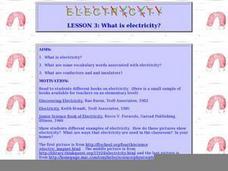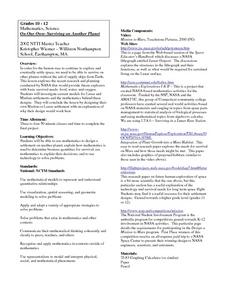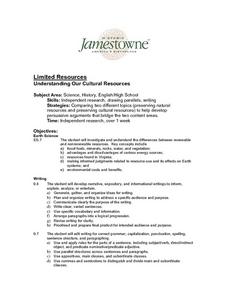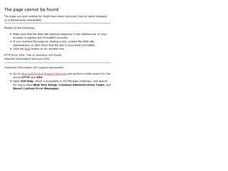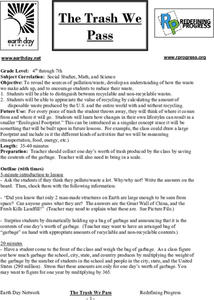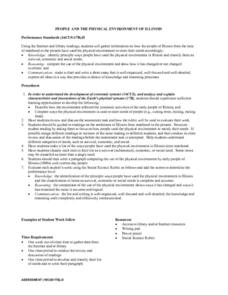Curated OER
A World of Myths
High schoolers read and write myths. In this world mythology lesson, students read and analyze myths from various cultures and then recognize their attributes as they write their own myths to explain natural phenomena.
Curated OER
Keep Your Eye on the Sky
Students examine the different types of satellites, cloud formations and weather patterns. In this weather lesson students use the Internet to research weather satellites, then write an article and create graphs.
Curated OER
A Bight is Born
Students sequence and model the events leading to the formation of the southeastern coast of the United States, including the formation of the South Atlantic Bight.
Curated OER
Unit 2 Sun & Stars
Students describe stellar objects using terms such as stars, planets, satellites, orbits and light. In this sun and stars unit, students research stellar objects through seven individual lessons discovering star characteristics, how...
Curated OER
Playground Modeling K-2
Students use and develop their spatial-visualization skills to represent features and physical objects on their playground. Working in groups, they use everyday classroom materials (blocks, crayons, counters, etc.) to build a simple...
Curated OER
The Search for Secret Agents
Students embark on a scavenger hunt around the school looking for indoor air pollution and mapping source locations. They predict and observe sources of indoor air pollution, understand and give examples of technologies we use related to...
Curated OER
Landscapes
Learners explore landforms and landscapes. They demonstrate an appreciation for and examine how to recognize the attributes of landforms and landscapes. Students create a landscape and reflect on their painting.
Curated OER
What Is Electricity?
Students investigate vocabulary words associated with electricity. In this electrical instructional activity, students utilize the Internet to research what electricity is and how it works. Students create an actual circuit in class...
Curated OER
Endocrine Excitement!
Students are divided into a group of hormones and a group of receptors. The hormones have to find their matching receptors, and the pair, once matched, perform a given action. This activity helps students examine the specificity of...
Curated OER
Earthquakes
Eighth graders demonstrate the mathematical components of a scientific problem as well as illustrate how real world problems can be solved using math. They demonstrate math skills such as rate calculation, graphing, and linear equations.
Curated OER
On Our Own- Surviving on Another Planet
Students investigate current models for Lunar and Martian settlements and study the mathematics behind these designs. They design their own Lunar or Martian settlement with an explanation of why their model would work best.
Curated OER
Europe – Religion and Reformation
Ninth graders examine the Reformation. In this European history lesson, 9th graders explore the 95 theses of Martin Luther and discuss the reaction of the Roman Catholic Church to his ideas. Students then take a quiz based on the lesson.
Curated OER
Geology
Pupils, in groups, observe the effect of water and ice on surface features of the land. They alsoexplore erosion and deposition.
Curated OER
Limited Resources - Understanding Our Cultural Resources
Students examine and compare preserving natural resources and preserving cultural resources. They conduct Internet research on two topics, and write a position paper on whether cultural resources or natural resources are more important...
Curated OER
Changes Close To Home
Pupils interview the senior citizens in their community. While interviewing them, they identify perceptions they have about the local climate. Using the internet, the compare the results of the interview to those of public thirty year...
Curated OER
Ions in the Environment
Students explain the importance of the five main biogeochemical cycles. In this chemistry lesson, students discuss how ions are transported in the environment. They design an experiment to collect data on eutrophication.
Curated OER
Playground Modeling
Students build a model of their school playground. They view models from the classroom (such as a globe, doll house, or cars). Students share observations about the models. They use a paper mat to represent the playground and use...
Curated OER
Two Ways About It
Students take an imaginary hike in two opposite directions along a lake. They view and interpret satellite images and discuss the pros and cons of hydroelectric dams.
Curated OER
Beach Zonation
Students identify and separate the different zones of the beach by observation. They investigate beach zonation by gathering and comparing sand samples gathered from different areas of the beach.
Curated OER
THe Trash We Pass
Students identify the sources of pollution and waste in their community. They examine the process of recycling and how to eliminate some of their family waste.
Curated OER
People and the Physical Environment of Illinois
Students read about the settlement of Illinois from statehood to the present. They categorize different areas of need such as survival, economic and social. Students make a list of ways people used the physical environment in Illinois...
Curated OER
Cosmology Who Am I?
Students identify what internally lets them know who they are. They identify what cultural aspects contribute to their identity. Students identify what how much is enculturation verses connection to the natural world. They review present...









